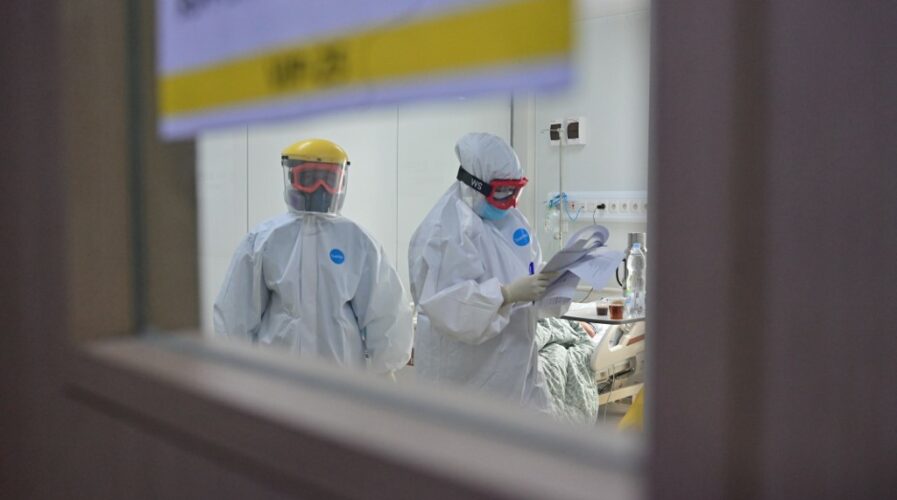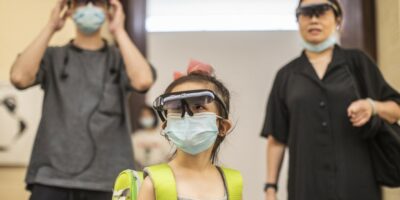
Healthtech startups gave a second opinion when Indonesia’s healthcare system was overrun during the pandemic. Source: AFP
Why mobile-first Indonesia was ready for healthtech
- Healthtech startups like mClinica and Naluri have stepped in to fill treatment voids when Indonesia’s healthcare system was overrun
With just 4,000 hospital beds for seriously-ill patients in an archipelago of 270 million people, Indonesia’s national healthcare system was quickly overwhelmed when the pandemic hit.
It was the time for health technology — or healthtech — to play a crucial role of reducing the strain on overburdened and under-equipped medical workers.
Indonesia has a large and growing pool of digital and entrepreneurial talent comprising software developers and designers, digital marketers, and those experienced with connecting startups and traditional corporations.
Healthtech is a competitive and fast-growing sector of this fertile startup ecosystem. Emerging in the country for years, it wasn’t until this year that the power of these platforms was recognized — reflecting a trend also seen in other parts of the world.
Since its first confirmed coronavirus case in March, Indonesia’s local telehealth firms saw usage skyrocket. Cutting rates of transmission, alleviating footfall from physical facilities especially for minor complaints, and enabling a wider pool of specialists to consult with patients anywhere with an internet connection, the advantages of these services are many.
And Indonesia was ready for them…
Mobile-ready patients
The Indonesian government itself has backed telehealth services. The country has many remote areas inaccessible for quick treatment, and its young, mobile-savvy population is increasingly relying on digital services to meet their needs, whether that’s retail, entertainment, dining, or now indeed, healthcare.
“The large expanse of the Indonesian archipelago and sprawling mega-cities mean access to healthcare professionals, that are already in short supply, is not convenient for many,” Azran Osman-Rani, the co-founder and CEO of Naluri, told Tech Wire Asia.
Naluri is a digital care provider that offers professional health coaching for the management of chronic conditions like diabetes, cancer, and mental health, amongst others, which are on the rise in the country as the population becomes more urbanized, lives more sedentary lives, and faces much more workplace and financial stress.
“Indonesian consumers are quick to adopt digital technology,” continued Osman-Rani, “smartphone penetration and mobile data access has reached a large majority of the population. Social media, e-commerce, and digital payments are already prevalent across most strata of society, all reducing the barriers to adopt health technology.
“Technology can improve access and affordability significantly.”
A healthtech boom
Active across Southeast Asia, mClinica is a healthtech startup that connects more than 170,000 pharmacy professionals from 40,000 regional pharmacies. The company lists Indonesia as its largest market by far. The company’s founder, Farouk Meralli, told us governmental support and rapid adoption of mobile technology are key factors of the healthtech boom in the nation.
“This has been supported, in large part, by a government that actively encourages the development of startups,” added Meralli. “This rapid uptake of digital services has coincided with rising incomes and greater expenditure on healthcare.
“The confluence of all these factors helps drive healthtech adoption,” he said.
“Access and affordability to medicine remain a key challenge to improving the lives of Indonesians nationwide. By solving such a large and pervasive problem in a country which has become incredibly tech-forward, it provides fertile ground to grow very fast.”
The advantages of healthtech startups in Indonesia aren’t just in providing more accessible healthcare and alleviating the strain on healthcare facilities, there are also significant financial benefits.
Telemedicine services can help cut back on overlooked medicinal costs, even as the country’s front-liners cope with the fallout from the coronavirus. Access and affordability to medicine remain a key challenge to improving Indonesians’ livelihood, and healthech startups have provided affordable alternatives for medications for things like managing chronic illnesses.
“Through our work at the pharmacy level, we have been able to reduce the price of medicines to the end patient by up to 60% and reduce stockouts by over 25% on certain critical medicines,” said Meralli.
Osman-Rani said his startup has a 50%-60% success rate of achieving clinically significant health outcomes: “For our corporate clients, these quantifiable health improvements translate into more than 5x return-on-investment and a notable direct financial benefit from reduced current and future medical expenses.”
Long after the pandemic is behind us, both Osman-Rani and Meralli believe in a competitive market where technology-based solutions will keep adding value and new, diverse solutions to the healthcare sector.
Covid-19 has highlighted just how viable and market-ready the country’s healthtech startups are, but with accessibility the goal, the real challenge remains how to ensure every one of the country’s citizen benefits.
“While it is always easier to begin with a more affluent urban segment, to truly serve every person, we are focused on serving all segments. The key for healthtech players is how do you serve everyone regardless of their location or income level?,” said Meralli.
“How do you improve healthcare not just at the top of the pyramid, but at the very base of it? That is a worthwhile challenge.”
READ MORE
- Ethical AI: The renewed importance of safeguarding data and customer privacy in Generative AI applications
- How Japan balances AI-driven opportunities with cybersecurity needs
- Deploying SASE: Benchmarking your approach
- Insurance everywhere all at once: the digital transformation of the APAC insurance industry
- Google parent Alphabet eyes HubSpot: A potential acquisition shaping the future of CRM


